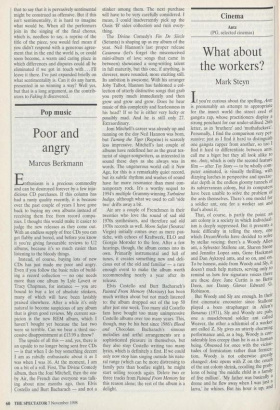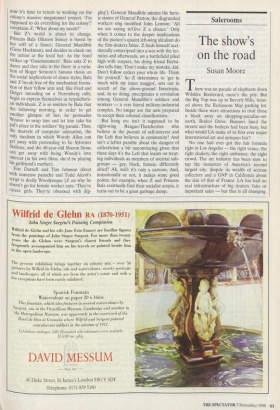Antz (PG, selected cinemas)
What about the workers?
Mark Steyn
If you're curious about the spelling, Antz is presumably an attempt to appropriate for the insect world the street cred of gangsta rap, whose practitioners display a strong penchant for our under-utilised 26th letter, as in trutherz' and `muthafuckerz'. Personally, I find the comparison very per- suasive: just as I find it hard to distinguish one gangsta rapper from another, so too I find it hard to differentiate between ants; call me a bigot but they all look alike to me. Antz, which is only the second feature film — after Toy Story — to be wholly com- puter animated, is visually thrilling, with dizzying lurches in perspective and spectac- ular depth in the endless gloomy tunnels of its subterranean colony, but its computers have been unable to solve the problem of the ants themselves. There's one model for a soldier ant, one for a worker ant and that's about it.
That, of course, is partly the point: an ant colony is a society in which individual- ism is deeply suppressed. But it presents a basic difficulty in telling the story, one which DreamWorks have decided to solve by stellar voicing: there's a Woody Allen ant, a Sylvester Stallone ant, Sharon Stone and Jennifer Lopez ants, Gene Hackman and Dan Aykroyd ants, and so on, and on. To be honest, aside from Woody and Sly, it doesn't much help matters, serving only to remind us how few signature voices there are these days: Jane Curtin is no Bette Davis, nor Danny Glover Edward G. Robinson.
But Woody and Sly are enough. In their first cinematic encounter since Stallone played a bozo straphanger in Allen's Bananas (1971), Sly and Woody are pals, one a musclebound soldier ant called Weaver, the other a schlemiel of a worker ant called Z. Sly gives an utterly charming performance and, as a bug, Woody is con- siderably less creepy than he is as a human. being. Obsessed for once with the vicissi- tudes of formication rather than fornica- tion, Woody is not otherwise greatly changed: Antz opens with Z on the couch of the ant colony shrink, recalling the pro.b" lems of being 'the middle child in a farrnlY of five million'. 'My father was basically a drone and he flew away when I was just a larva,' he whines. But his hour is up, and now it's time to return to working on the colony's massive megatunnel project. 'I'm supposed to do everything for the colony?' complains Z. 'What about my needs?'
But Z's world is about to change. Princess Bala (Sharon Stone) is bored by her stiff of a fiancé, General Mandible (Gene Hackman), and decides to check out the action at the local bar. As the band strikes up `Guantanamera', Bala asks Z to dance and they take to the floor: in a varia- tion of Roger Scruton's famous thesis on the social implications of dance styles, Bala and Z break free of the mechanical forma- tion of their fellow ants and, like Fred and Ginger intruding on a Nuremberg rally, begin to express themselves as terpsichore- an individuals. Z is so smitten by Bala that the following morning, in order to get another glimpse of her, he persuades Weaver to swap him and let him take his pal's place in the soldiers' big parade. Thus, the marvels of computer animation, the Only medium in which Woody Allen can get away with pretending to be Sylvester Stallone, and the 40-year-old Sharon Stone Can get away with being Woody's love interest (in his own films, she'd be playing his girlfriend's mother). Eric Darnell and Tim Johnson direct With immense panache and Todd Alcott's script is drolly Woodyesque (Z on why he doesn't go for female worker ants: 'They're career girls. They're obsessed with dig- ging'). General Mandible mimics the hero- ic stance of General Patton; the disgruntled workers sing modified John Lennon: 'All we are saying is/Give Z a chance.' Only when it comes to the deeper implications of the picture's quaint left-wing idealism do the film-makers falter. Z finds himself acci- dentally conscripted into a war with the ter- mites and afterwards, on a battlefield piled high with corpses, his dying friend Barba- dos tells him, 'Don't make my mistake, kid. Don't follow orders your whole life. Think for yourself.' So Z determines to 'get in touch with my inner maggot', sets out in search of the above-ground Insectopia, and, in so doing, precipitates a revolution among General Mandible's soldiers and workers — a very literal military-industrial complex. No longer are the ants prepared to accept their colonial classifications.
But hang on: isn't it supposed to be right-wing Reagan-Thatcherites who believe in the pursuit of self-interest and the Left that believes in community? And isn't a leftist parable about the dangers of collectivism a bit unconvincing given that these days it's the Left that insists on treat- ing individuals as members of societal sub- groups — gay, black, female, differently abled? Ah, well: it's only a cartoon. And, intentionally or not, it makes some good points: for example, when Z and Princess Bala eventually find their socialist utopia, it turns out to be a giant garbage dump.



















































































 Previous page
Previous page